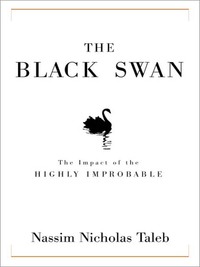 Even though I read it earlier this year, I never got around to reviewing Nassim Nicholas Taleb’s The Black Swan. I don’t know who to attribute the reference to, but I ran across a critique of the book by David Aldous. This paragraph best sums up my reading of the book as well:
Even though I read it earlier this year, I never got around to reviewing Nassim Nicholas Taleb’s The Black Swan. I don’t know who to attribute the reference to, but I ran across a critique of the book by David Aldous. This paragraph best sums up my reading of the book as well:
A “Black Swan” is defined as an event characterized [p. xviii] by rarity, extreme impact, and retrospective (though not prospective) predictability, and Taleb’s thesis is that such events have much greater effect, in financial markets and the broader world of human affairs, than we usually suppose. The book is challenging to review because it requires considerable effort to separate the content from the style. The style is rambling and pugnacious — well described by one reviewer as “with few exceptions, the writers and professionals Taleb describes are knaves or fools, mostly fools. His writing is full of irrelevances, asides and colloquialisms, reading like the conversation of a raconteur rather than a tightly argued thesis.” And clearly this is perfectly deliberate. My own overall reaction is that Taleb is sensible (going on prescient) in his discussion of financial markets and in some of his general philosophical thought, but tends toward irrelevance or ridiculous exaggeration otherwise. Let me run through some discussion topics, first 6 where I broadly agree with Taleb, then 6 where I broadly disagree, then 4 final thoughts.
Aldous’ entire critique is worth reading. He also links to a couple of other reviews from hardcore statisticians picking apart various technical aspects of The Black Swan.